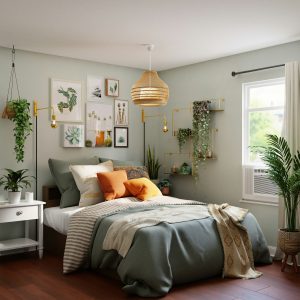Chapter 1.2: Grammar in Context—Describing Places
Learning Objectives
In this chapter, you will:
- Learn the structure of place nouns and how to use them in context.
- Learn how to describe a house using fronted predicate and location prepositions.
Grammar 1: Nouns of Place
اسم المكان
Do you remember the following words? What do they have in common?
- مَطبَخ ج. مطابِخ
- مَكتَب ج. مكاتِب
- مَكتَبة ج. مكتبات
- مَسبَح ج. مسابِح
- مَطعَم ج. مطاعِم
They all refer to places: places where we cook, write, swim, eat, and so forth. This category of nouns in Arabic are called اسم مكان, literally place noun.
These nouns follow a particular pattern مَفعَل and the plural is مفاعِل. Few exceptions exist like مكتبة – مكتبات.
Few nouns follow the pattern مَفعِل. Consider the following:
- مَجلِس ج . مجالِس council (the place where one sits)
- مَنزِل ج. منازِل residence (the place where one stays)
Examples
Consider the root سَكَن:
- What meaning does it invite? Yes: it has to do with living or residing.
- Now put this root into the pattern مَفعَل
- We come up with the word مَسكَن
- This is the place where you live or reside.
- مَسكَن place of residence and its plural مساكِن
- Consider the following and guess the meanings based on the roots.
Activity 7: Place Nouns and Plurals of Roots
Figure out the meanings of the roots listed and create place nouns and their plurals for each.
Grammar 2: Definite and Indefinite Idafa
الإضافة المعرفة والنكرة
Our typical knowledge about Idafa tells us that it is definite (consisting of indefinite noun followed by definite noun).
Examples:
غرفة النوم – غرفة الجلوس – مكتب والدي
All these refer to specific entities (the bedroom, the living room, and my father’s office).
However, there are contexts when you express Idafa in its indefinite structure. What are these contexts?
Examples
Consider the difference between the following:
| Arabic | English |
|---|---|
| غرفة النوم في بيتي كبيرة | The bedroom in my house is big |
| عندي غرفة نوم كبيرة في بيتي | I have a big bedroom in my house |
| استراحة الغداء الساعة الواحدة | The lunch break is at one O’clock. |
| هناك استراحة غداء الساعة الواحدة | There is a lunch break at one O’clock |
Indefinite Idafa commonly occur with existential pharses like “there is/are” or after numerals counting the items (for example: three bedrooms).
Compare the following:
- حمام السباحة خلف البيت
- هناك حمام سباحة خلف البيت
- غرف النوم في الطابق الثاني
- هناك 3 غرف نوم في الطابق الثاني
Watch the following video for more elaboration on the concept of indefinite Idafa.
Activity 9: Definite vs. Indefinite Idafa in Context
Decide whether a definite or indefinite Idafa is appropriate in each of the following contexts.
Grammar 3: Fronted Predicate
الخبر المقدم
In describing places and houses, you encountered sentences like the following:
أمام البيت حديقة صغيرة = هناك حديقة صغيرة أمام البيت
في بيتي أربع غرف نوم = بيتي فيه أربع غرف نوم
في هذه المنطقة بيوت كثيرة = هذه المنطقة فيها بيوت كثيرة
The previous examples all show nominal sentences which consist of مبتدأ subject and خبر predicate. The usual order of them is reveresed because المبتدأ is indefinite and you cannot start a sentence in Arabic with an indefinite subject. This is why the prepositional phrase jumps in front of the subject and is described as a fronted predicate.
Examples
Consider the following examples and rephrase them in different ways:
- في هذا الشارع مكتبة عامة
- في جامعتنا بنايات كثيرة
- عندي سيارة جديدة
- هناك شباك كبير في هذه الغرفة
- ليس هناك طلاب من أصل عربي في فصلنا
Activity 10: Mark the Subject
Analyze the sentences and mark the subject.
Watch this video for more elaboration on the concept of fronted predicate.
Grammar 4: Dual
المُثني
In describing your house, you may need to say “two rooms”, or “two floors”. The concept of two things in Arabic is less than a plural, and it is treated as a dual.
Examples
Study the following sentences.
|
Dual |
Singular |
|
|---|---|---|
|
بيتي يتكون من طابقين My house consists of two floors |
بيتي يتكون من طابق واحد My house consists of one floor |
(1) |
|
في الطابق الثاني غرفتان كبيرتان وحمامان In the second floor two big rooms and two bathrooms |
في الطابق الثاني غرفة كبيرة وحمام In the second floor a big room and a bathroom |
(2) |
|
هذان كتابان جديدان سندرسهما في الفصل These are two new books we will study in class |
هذا كتاب جديد سندرسه في الفصل This is a new book we will study in class |
(3) |
|
نيويورك وشيكاغو مدينتان كبيرتان New York and Chicago are two big cities |
نيويورك مدينة كبيرة New York is a big city |
(4) |
Identify the Dual
Did you figure out how the dual is formed? To summarize, study the following rules:
Activity 11: Convert Sentences to Dual
Verbs in use
الفعل (يتمنّى)
Study the conjugation of the verb “to wish”.
| English | Arabic |
|---|---|
| I wish | أنا أتمنّى |
| You (m.) wish | أنتَ تتمنّى |
| You (f.) wish | أنتِ تتمنين |
| He wishes | هو يتمنّى |
| She wishes | هي تتمنّى |
| We wish | نحن نتمنّى |
| You (pl.) wish | أنتم تتمنّون |
| They wish | هم يتمنّون |
Activity 12: Conjugation Practice of “To Wish” and “To Buy”
Practice the conjugation of the verb “to wish” and learn how to do the similar verb “to buy”.
Do the same for the verb يقضي “to spend time”.
المصباح السحري
Activity 13: My Dream House
Talk about your dream house using the following prompts and images. Make use of the location prepositions, place nouns and fronted predicate. Record your response in the audio box below.
- أتَمنّى أن أعيش في بيت فيه blank
- أمام البيت blank
- خَلف البيت blank
- البيت يَتكوّن من blank طوابِق
- في الطابق الأول blank
- في الطابق الثاني blank
- في غرفة المعيشة blank
- غرفة النوم فيها blank



Key Takeaways
- I can identify and create place nouns in Arabic.
- I can describe a house in detail using relevant structures.


